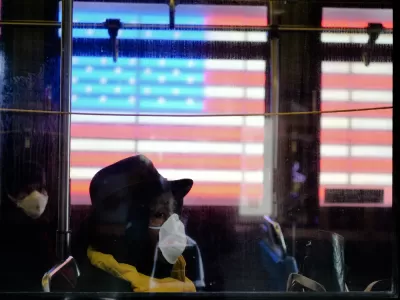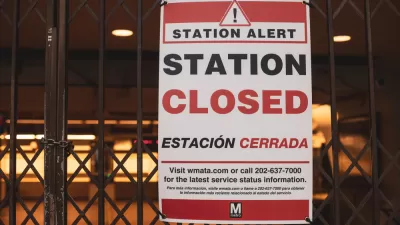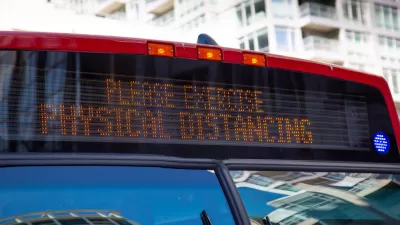After months of nothing but news of service cuts, plummeting ridership, and cratered budgets, a few U.S. transit agencies are now making plans to restore service with new social distancing guidelines in place.

Paul J. Wiedefeld, general manager and CEO of the Washington Metropolitan Area Transit Authority, writes for The Washington Post to explain that transit system's plans to reopen as the region slowly emerges from stay-at-home orders and some workers return to work.
Metro ridership has plummeted to historic lows and that’s a good thing — for now. Customers are making only essential trips to protect the health of everyone in the region. Planning for recovery from the covid-19 shutdown isn’t like reopening after a blizzard. This is not a “start your engines” moment. This principle guides our plans to implement phased recovery over the next 12 months.
The Metro system is currently only using half of its frontline employees, according to Wiedefeld, who claims the agency, working with its employee union, has worked rigorously to protect the health of employees during the public health crisis. Wiedefeld also states that the first job of the system's recovery plan will be to protect the health and safety of its workforce.
Second, the plan will consider customer expectations regarding masks, cleaning, and efforts to reduce crowding on high demand routes at peak times. "Our recovery plan anticipates that when regional leaders move to the first phases of reopening, trains will run every 20 minutes. The first and eighth cars, which have been closed to passengers, will reopen. Buses will continue to operate on Sunday routes and schedules."
Later on, depending on the timing of subsequent phases in Maryland, Virginia and the District, Metro "will begin to reopen stations, increase train frequency and operate more bus routes later this summer and into the fall," according to Wiedefeld.
More news coverage of the transit reopening plan for the D.C. region are included in an article by Jordan Pascale for WAMU. Seattle's King County Metro has also revealed its plans to begin restoring transit service with new considerations for social distancing and the health and safety of both riders and transit employees in place.
FULL STORY: How Metro plans to gradually return to full service

Alabama: Trump Terminates Settlements for Black Communities Harmed By Raw Sewage
Trump deemed the landmark civil rights agreement “illegal DEI and environmental justice policy.”

Study: Maui’s Plan to Convert Vacation Rentals to Long-Term Housing Could Cause Nearly $1 Billion Economic Loss
The plan would reduce visitor accommodation by 25% resulting in 1,900 jobs lost.

Planetizen Federal Action Tracker
A weekly monitor of how Trump’s orders and actions are impacting planners and planning in America.

Wind Energy on the Rise Despite Federal Policy Reversal
The Trump administration is revoking federal support for renewable energy, but demand for new projects continues unabated.

Passengers Flock to Caltrain After Electrification
The new electric trains are running faster and more reliably, leading to strong ridership growth on the Bay Area rail system.

Texas Churches Rally Behind ‘Yes in God’s Back Yard’ Legislation
Religious leaders want the state to reduce zoning regulations to streamline leasing church-owned land to housing developers.
Urban Design for Planners 1: Software Tools
This six-course series explores essential urban design concepts using open source software and equips planners with the tools they need to participate fully in the urban design process.
Planning for Universal Design
Learn the tools for implementing Universal Design in planning regulations.
Caltrans
Smith Gee Studio
Institute for Housing and Urban Development Studies (IHS)
City of Grandview
Harvard GSD Executive Education
Toledo-Lucas County Plan Commissions
Salt Lake City
NYU Wagner Graduate School of Public Service




























